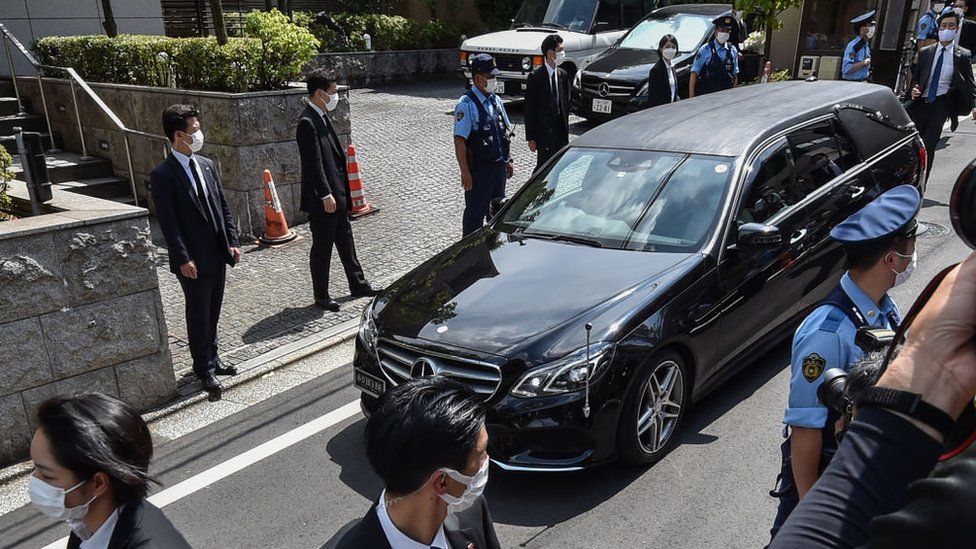
This article is more than
3 year old
"It is undeniable that there were problems in the security," said Nara police chief Tomoaki Onizuka.
A gunman opened fire on Abe at a political campaign event - a crime that has profoundly shocked Japan.
A motorcade carrying Abe's body has arrived at his home in Tokyo.
Police say the suspect, named as Tetsuya Yamagami, 41, held a grudge against a "specific organisation". He believed Abe was part of it, they said.
Yamagami has admitted shooting him with a homemade gun, according to police.
"The urgent matter is for us to conduct a thorough investigation to clarify what happened," police chief Onizuka said, without specifying where he saw failings. He was on the verge of tears, addressing journalists.
Japanese media quote sources close to the investigation, who say Yamagami believed Abe to be linked to a religious group which, Yamagami alleged, had ruined his mother financially.
Yamagami told police he had served in Japan's navy, the Maritime Self-Defense Force, for three years. More recently, he had worked at a factory in western Japan.
As a hearse carrying Abe's body arrived at his residence in Tokyo, members of his ruling Liberal Democratic Party (LDP), dressed in black, lined up to pay their respects.
According to local media reports, a night vigil will be held on Monday and Abe's funeral is due to take place on Tuesday.
Abe was Japan's longest-serving prime minister and died aged 67. He was campaigning for the LDP in the run-up to upper house parliamentary elections on Sunday.
Current Prime Minister Fumio Kishida, also an LDP member, said he was "simply speechless", vowing that Japan's democracy would "never yield to violence".
He said the election campaign would continue on Saturday with tightened security, with Sunday's vote still set to go ahead.
Gun violence is extremely rare in Japan, where handguns are banned and incidences of political violence are almost unheard of.

Police are investigating why Abe was targeted and whether his killer acted alone.
Abe was giving a speech on behalf of a political candidate at a road junction when he was shot from behind. Photos show the suspect standing close to Abe moments beforehand.
Witnesses described seeing a man carrying a large gun moving within a few metres of Abe and firing twice. The former prime minister fell to the ground as bystanders screamed in shock and disbelief.
Security officers dived on to the gunman, who made no attempt to run.
The twin-barrelled weapon that killed Abe was crudely made with metal and wood, wrapped in heavy-duty black tape.
Several other handmade guns and explosives were later found at the suspect's home.
Abe was wounded in the neck and was bleeding profusely as he was airlifted to hospital.
He was said to be conscious and responsive in the minutes after the attack, but doctors said no vital signs were detected by the time he was transferred for treatment.
Medics worked for hours to save him before he was pronounced dead at 17:03 local time (08:03 GMT) on Friday.

On Japanese social media, the hashtag "We want democracy, not violence" was trending throughout Friday, with many users expressing their horror and disgust over the incident.
In 2014, there were just six incidents of gun deaths in Japan, compared to 33,599 in the US. People have to undergo a strict exam and mental health tests in order to buy a gun. Even then, only shotguns and air rifles are allowed.
Abe first held office for a year in 2006 and then again from 2012 to 2020 before stepping down, citing health reasons.
While he was in office, he pushed more assertive policies on defence and foreign policy and had long sought to amend Japan's pacifist post-war constitution.
He also pushed for an economic policy that came to be known as "Abenomics", built on monetary easing, fiscal stimulus and structural reforms.